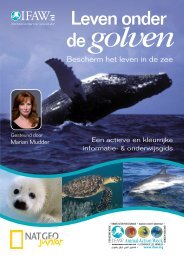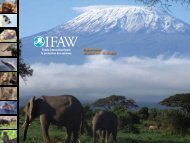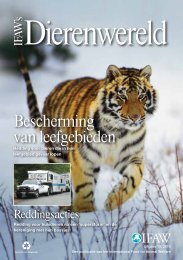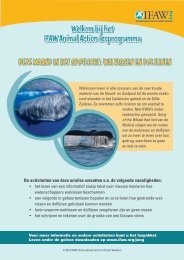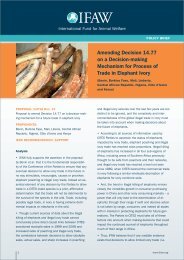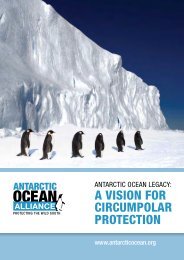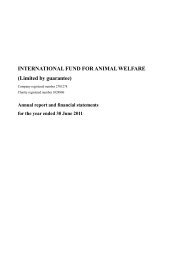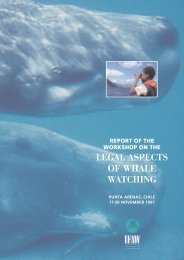- Page 1 and 2:
Whale Watching Worldwide Tourism nu
- Page 3 and 4:
Whale Watching Worldwide: Tourism n
- Page 5 and 6:
GEORGIA, UKRAINE AND RUSSIA - BLACK
- Page 7 and 8:
ST. LUCIA..........................
- Page 9 and 10:
Foreword: IFAW and Whale Watching 1
- Page 11 and 12:
Sidney Holt, at that time IFAW Scie
- Page 13 and 14:
Australia, New Zealand and the Sout
- Page 15 and 16:
watching trips started (Papastavrou
- Page 17 and 18:
For the past four years, IFAW has c
- Page 19 and 20:
• Research on the effectiveness o
- Page 21 and 22:
Hoyt, E. 2001. Whale Watching 2001:
- Page 23 and 24:
Executive Summary Ten years after t
- Page 25 and 26:
South America too is showing strong
- Page 27 and 28:
Map of the global distribution of w
- Page 29 and 30:
Introduction Cultures across the gl
- Page 31 and 32:
was achieved. Responses in many cou
- Page 33 and 34:
Generally in economics, ‘indirect
- Page 35 and 36:
February 2009 for consistency. Desp
- Page 38 and 39:
Regions The following section of th
- Page 40 and 41:
AFRICA AND MIDDLE EAST Year Number
- Page 42:
Summary of country results Country
- Page 45 and 46:
Benin Year Number of whale watchers
- Page 47 and 48: Canary Islands Year Number of whale
- Page 49 and 50: Egypt Year Number of whale watchers
- Page 51 and 52: Local Case Study: Samadai Reef, Egy
- Page 53 and 54: Gabon Year Number of whale watchers
- Page 55 and 56: Mervyn Baldwin (Pleasuresports Gamb
- Page 57 and 58: In February 2009, political protest
- Page 59 and 60: • Local people make up a signific
- Page 61 and 62: Mauritius Year Number of whale watc
- Page 63 and 64: Acknowledgements: Nils Bertrand (Se
- Page 65 and 66: egulation of the industry and has c
- Page 67 and 68: novel Static Acoustic Monitoring te
- Page 69 and 70: Main species: Large cetaceans: Bryd
- Page 71 and 72: São Tomé and Príncipe Year Numbe
- Page 73 and 74: Seychelles Year Number of whale wat
- Page 75 and 76: Land‐based whale watching also co
- Page 77 and 78: Local Case Study: Hermanus, South A
- Page 79 and 80: Although the industry is clearly im
- Page 81 and 82: The type of cetacean watching shows
- Page 84 and 85: Croatia Year Number of whale watche
- Page 86 and 87: Denmark Year Number of whale watche
- Page 88 and 89: France Year Number of whale watcher
- Page 90 and 91: Germany Year Number of whale watche
- Page 92 and 93: Greece Year Number of whale watcher
- Page 94 and 95: There is also a whale watching indu
- Page 96 and 97: Main species: Large cetaceans: blue
- Page 100 and 101: Dolphin watch tours last two hours
- Page 102 and 103: Monaco Year Number of whale watcher
- Page 104 and 105: Main species: Large cetaceans: hump
- Page 106 and 107: Main species: Large cetaceans: blue
- Page 108 and 109: Neves‐Graça, K. 2004. Revisiting
- Page 110 and 111: Portugal ‐ Mainland Year Number o
- Page 112 and 113: Acknowledgements: Tilen Genov of Mo
- Page 114 and 115: United Kingdom Year Number of whale
- Page 116 and 117: Scotland Year Number of whale watch
- Page 118 and 119: Wales Year Number of whale watchers
- Page 120 and 121: Asia Year Number of whale watchers
- Page 122 and 123: 122
- Page 124 and 125: Cambodia and Laos Year Number of wh
- Page 126 and 127: China China (Mainland) Year Number
- Page 128 and 129: expenditure figure is largely expla
- Page 130 and 131: Georgia, Ukraine and Russia - Black
- Page 132 and 133: Ganges River dolphin and Irrawaddy
- Page 134 and 135: Whales migrate between the Pacific
- Page 136 and 137: Kyushu Year Number of whale watcher
- Page 138 and 139: Ogasawara, Miyakejima, Mikurajima Y
- Page 140 and 141: Acknowledgements: Thanks to all eig
- Page 142 and 143: Local Case Study: Japan Internation
- Page 144 and 145: Maldives Year Number of whale watch
- Page 146 and 147: Thanks to Brian Smith of WCS for hi
- Page 148 and 149:
Philippines Year Number of whale wa
- Page 150 and 151:
September to May. Puerto Princessa
- Page 152 and 153:
Sri Lanka Year Number of whale watc
- Page 154 and 155:
Main species: Small cetaceans: Irra
- Page 156 and 157:
epresents a significant average ann
- Page 158 and 159:
158
- Page 160 and 161:
Antarctica Year Number of whale wat
- Page 162 and 163:
Australia Year Number of whale watc
- Page 164 and 165:
Queensland Year Number of whale wat
- Page 166 and 167:
New South Wales Year Number of whal
- Page 168 and 169:
Victoria Year Number of whale watch
- Page 170 and 171:
Tasmania Year Number of whale watch
- Page 172 and 173:
although the management plan for th
- Page 174 and 175:
Main species: Large cetaceans: hump
- Page 176 and 177:
• It is the only known predictabl
- Page 178 and 179:
Main species: Tourists: Large cetac
- Page 180 and 181:
formal cetacean watching industry 4
- Page 182 and 183:
Acknowledgements: Michael Poole (Ma
- Page 184 and 185:
Midway Year Number of whale watcher
- Page 186 and 187:
Acknowledgements: Claire Garrigue a
- Page 188 and 189:
North Island Year Number of whale w
- Page 190 and 191:
Main species: Large cetaceans: sper
- Page 192 and 193:
Palau Year Number of whale watchers
- Page 194 and 195:
References: Research for this count
- Page 196 and 197:
References: Research for this count
- Page 198 and 199:
North America Year Number of whale
- Page 200 and 201:
200
- Page 202 and 203:
British Columbia Year Number of wha
- Page 204 and 205:
Québec Year Number of whale watche
- Page 206 and 207:
Nova Scotia and New Brunswick Year
- Page 208 and 209:
Most whale watchers in Newfoundland
- Page 210 and 211:
Acknowledgements: Thanks to the ope
- Page 212 and 213:
St. Pierre and Miquelon Year Number
- Page 214 and 215:
Alaska Year Number of whale watcher
- Page 216 and 217:
Hawaii Year Number of whale watcher
- Page 218 and 219:
Hawaiian Islands (Hawaii, Maui, Oah
- Page 220 and 221:
considerably less than those depart
- Page 222 and 223:
Nevertheless, the industry is undou
- Page 224 and 225:
With the number of boat‐based wha
- Page 226 and 227:
In Santa Barbara and Ventura County
- Page 228 and 229:
New England Year Number of whale wa
- Page 230 and 231:
Local Case Study: Stellwagen Bank,
- Page 232 and 233:
Cetacean watching in Virginia is ba
- Page 234 and 235:
participated in a workshop on the p
- Page 236 and 237:
Central America and Caribbean Year
- Page 238 and 239:
Summary of country results Country
- Page 240 and 241:
Antigua and Barbuda Year Number of
- Page 242 and 243:
organise dedicated land‐based act
- Page 244 and 245:
Bermuda Year Number of whale watche
- Page 246 and 247:
Costa Rica Year Number of whale wat
- Page 248 and 249:
neighbours, earning it the reputati
- Page 250 and 251:
Dominican Republic Year Number of w
- Page 252 and 253:
Grenada Year Number of whale watche
- Page 254 and 255:
Acknowledgements: Evasion Tropicale
- Page 256 and 257:
Jamaica Year Number of whale watche
- Page 258 and 259:
Maillard, J 2004, ‘Orientations R
- Page 260 and 261:
Panama Year Number of whale watcher
- Page 262 and 263:
St. Kitts and Nevis Year Number of
- Page 264 and 265:
Acknowledgements: Thanks to two ope
- Page 266 and 267:
Turks and Caicos Islands Year Numbe
- Page 268 and 269:
South America Year: Number of whale
- Page 270 and 271:
270
- Page 272 and 273:
References: Hoyt, E & Iñíguez, M
- Page 274 and 275:
Estimated employment 62 numbers: Ma
- Page 276 and 277:
Main species: Large cetaceans: Bryd
- Page 278 and 279:
Falkland Islands (Las Malvinas) Yea
- Page 280 and 281:
References: Hoyt, E & Iñíguez, M
- Page 282 and 283:
Venezuela Year Number of whale watc
- Page 284 and 285:
thouands. Through the 1990s, two re
- Page 286 and 287:
for starting up sustainable whale w
- Page 288 and 289:
Bibliography Agardy, T, Aguilar, N,
- Page 290 and 291:
Hoyt, E 2001, ‘Whale Watching 200
- Page 292 and 293:
SPREP, Whale and Dolphin Action Pla
- Page 294 and 295:
A. Business name: B. Contact name:









